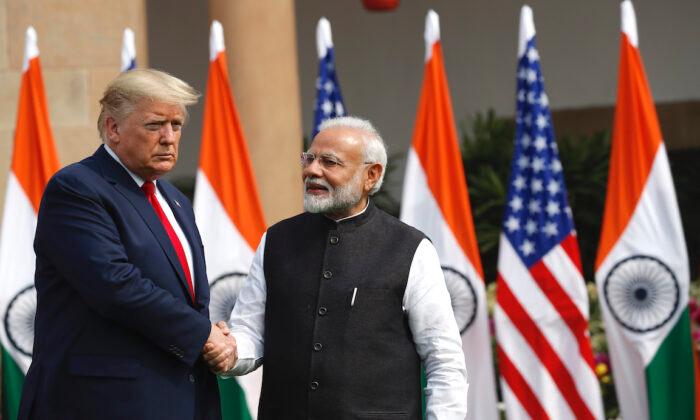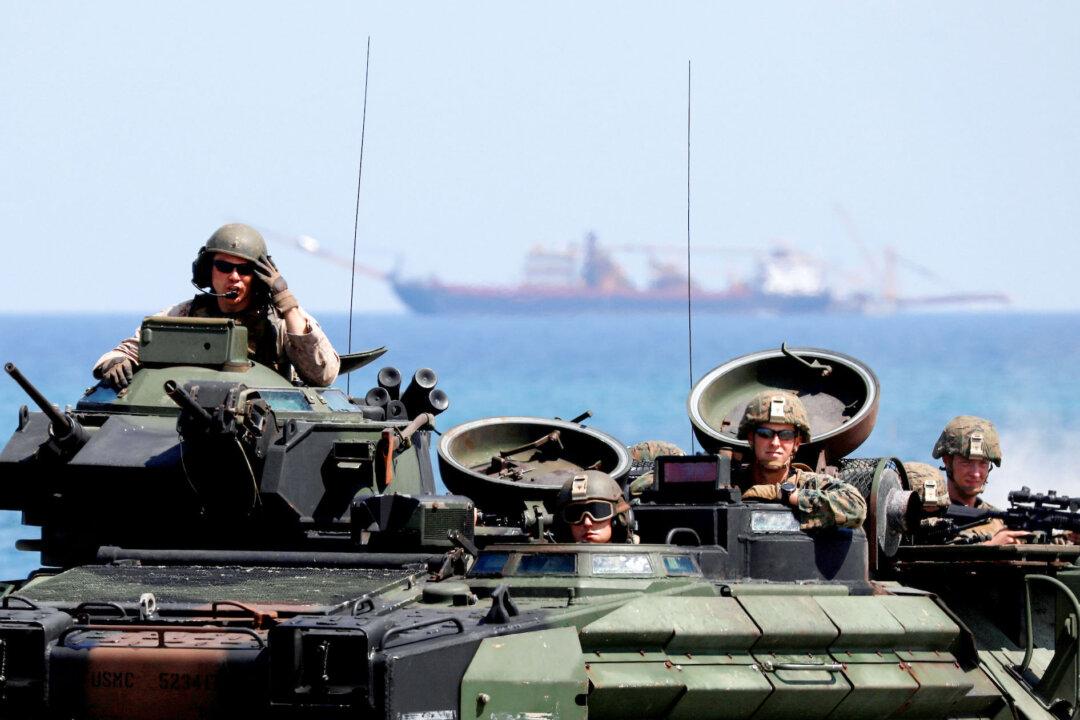NEW DELHI—Lotfullah Najafizada, 33, director of Afghanistan’s biggest news broadcaster, TOLOnews, has seen things up close in his war-torn country—death threats, deaths, injuries to his employees, and accolades for fearless journalism.
“I think Afghans are pro-engagement, pro-partnership, where the U.S. and the Afghan leaders are saying that there is going to be a new chapter in the partnership with the U.S.,” Najafizada said, about what Afghans would like to communicate with Biden at this point.
“We don’t know how the new chapter is going to look. It’s not really explained—explained well. But I think the Afghan people are for partnership, not with just the U.S. but with everyone.
“Because we’ve seen the cost of isolation, and that price is very, very high.”
“And for that, we need to work together, we need [to work together] with everyone at the global stage. And Afghans are, I think, quite determined about it,” he said. “We have a say because we are one side of the table. and I think our say is very simple. We are fighting on behalf of ourselves and for the security of the world in one of the most difficult areas of the world.”
The terrorists aren’t just targeting Afghans but want an opportunity to attack people beyond the borders, according to Najafizada.
“These people who are here, they are enemies of India, enemies of China, enemies of Russia, enemies of the U.S. and the West. And enemies of Iran,” he added, noting that Afghans will play their role in case of a fight.

The China Angle
When asked if the new situation in Afghanistan will lead to a new “Great Game,” with China replacing the former Soviet Union, Najafizada said he doesn’t see anybody replacing the support being offered by the United States.“I don’t think that China is really that aggressive when it comes to their Afghanistan policies. Only $4 [billion] to $5 billion a year is needed to fund the Afghan security forces, another $3 [billion] to $4 billion are given to the civilian budget, mostly by the U.S.,” he said. “I know that the U.S. troops are leaving, but that support continues until 2024.”
While the United States and China are two big global powers and have competing interests, he said he doesn’t think Afghanistan is their top region of competition.
“I don’t see any power in the region or beyond to be able to either afford it or be willing to do that too, even if they have the money,” he said.
By the time the U.S. troops leave by September, the region must decide collectively whether it wants to “deal with a civil war next door, or all of us join hands and then we make peace.”
But Najafizada said he doesn’t envision Chinese troops inside Afghanistan.
“I don’t think the partnership or collaboration with China is that strong. I don’t think that it will be at any time in the near future.”
Afghans have concerns about the reports about human rights violations inside Xinjiang, he said.
“We are unhappy about it as Muslims, as human beings. I think Afghans have been quite vocal about it, of all the reports and violations of human rights that we hear in that part of China, which is neighboring Afghanistan, by the way.”

Regional Issues and Influences
Najafizada said the conflict is a problem of Afghan people first but since the persisting issues are regional, the country needs regional and global support for the resolution.“There are many international terrorist organizations that we fight, not just for ourselves, but for the security of all members of the international community, India included. So, for that, we need regional support and international support,” he said.
“I mean, this is an unfortunate case of conflict, with regional reasons and roots for a very long time. So, this is first a problem for Afghans because we pay the ultimate price. Then it’s a problem for the region, then it is a problem for the world.”
No one should be able to use Afghan soil to plan a 9/11 ever again, said Najafizada.
“Nobody should feel threatened by the Afghans. For that, we need collective efforts for peace.”
Afghanistan shares a border with Pakistan, including the disputed region of Gilgit-Baltistan that Pakistan controls and India claims, and through which China is building the China Pakistan Economic Corridor Project. It also shares borders with Iran, the Central Asian countries of Turkmenistan, Uzbekistan, and Tajikistan, and a short border with Xinjiang.
Najafizada said all countries that share borders with Afghanistan have some influence over the situation in the country.
“I think all regional countries, including Iran, including Pakistan, are quite influential; you cannot rule that out,” he said when asked if there are Iranian proxies inside Afghanistan.
“I can’t go into the extent to explain or provide evidence that there are proxies, as you said, in the government, or elsewhere in society, of course, we’re neighbors. With all of these countries, we will have ties,” Najafizada said.
“We share language, religion, and there are similarities. And then there are common interests. And then there are gestures and goodwill, emotional connections, those are there. And these are powerful countries.”
Since the regional powers are involved and have influence over the situation inside Afghanistan—that should be leveraged for peace, he said.
“Because they know they will benefit from peace more than they benefit from war. Especially now that the international troops are leaving. So this is a window of opportunity for all of them, for Iran, for Pakistan, for India, for Russia, for China. For all of these big, big players, just next door,” Najafizada said.
He said the region includes historical adversaries and Afghanistan has to make sure that it isn’t used against any of its neighbors.

The Afghan Narrative
The Epoch Times asked Najafizada about Afghanistan’s own narrative—as a country ravaged by war, dependent on aid, and currently facing instability due to the impending U.S. troop withdrawal—amid trending regional and global opinions.“I think the Afghan narrative is that the country has to figure out, solve problems—find solutions for it,” he said, noting that the Afghan people are very “resilient” and have demonstrated it in the past 40 years of conflict.
“We have not separated as a nation. We have not! We’ve paid a huge price. Powers have come and gone and abandoned and intervened and invaded us. But I think the Afghan nation as a whole ... has been quite persistent.”
Najafizada said he’s speaking from the perspective of someone in Kabul, who has been raised here, and who has seen it all.
“I’m quite optimistic. It doesn’t mean it’s not going to be difficult. I’m not saying how Afghanistan’s history is going to judge the U.S. intervention,” he said.
“Or how the world will see the last 20 years from a Western perspective, because that’s a Western issue. But the Afghan issue is that we’ve seen a lot of ups and downs. I think this year is going to be very, very critical. Hopefully, we can make a political settlement with the Taliban, and that will be a positive thing.
“If not, I’m afraid that it will be more bloodshed and fighting.”
Najafizada said the Afghans are determined to do what they can for peace. He said the war isn’t good, it has been going on for so long, and it must end.
“This is not good. This is ... quite frustrating,” said Najafizada. “It’s very difficult for people. The past two or three generations—all they’ve seen is violence and bloodshed.”
He said he has personally experienced it—his earliest childhood memory is of the early years of the 1990s when a rocket landed on his family home in Kabul, and while growing up, his family moved around to different Afghan cities to flee the conflict.
He said he’s not trying to paint a rosy picture, but trying to emphasize that there’s no other option but to work for peace. He said he dreams of a democratic Afghanistan that’s capable of playing a positive role in the global arena.
“We fight for Afghanistan [to] be a democratic country, a very constructive player on the globalist stage; friendly relationships with the rest of the world. Prosperous at home, where girls, children, women, minorities, have equal rights,” he said.
“And this is the Afghanistan that we envision and we work tirelessly to get there. We have come a long way in the past 20 years. We will continue to do that. So that’s why I’m here and that’s why we do what we do.”





